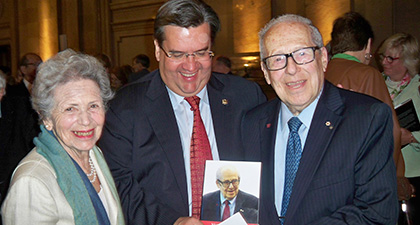MONTREAL — At 92, Victor Goldbloom is still in awe of what being a Quebecer and Canadian allowed him to make of his life.
“My four grandparents [immigrants from Russia and the Baltic states] could not possibly have known what an exceptional choice they made in choosing Montreal,” said Goldbloom at the launch of his memoir held at Montreal city hall on June 1.
“The things I have been part of, never in their wildest dreams would they have thought imaginable for their grandson, that I would have the privilege to do what I have been able to do.”
Most of all, what he did was try to promote understanding and reconciliation between people.
The memoir has been published simultaneously in English and French as Building Bridges (McGill-Queen’s University Press) and Les Ponts du Dialogue [Editions du Marais].
Son Michael Goldbloom, principal of Bishop’s University and a member of The CJN's board of directors, said he had been urging his father to write a memoir for 15 years. “But he was busy, too focused on looking to the future to have time for the past,” he said.
‘Retirement’ is a word the elder Goldbloom uses only within inverted commas.
He chose and typed every word, there was no ghostwriter, his son added, and he translated the original English into French himself.
The English version’s foreword is by Graham Fraser, commissioner of official languages, a federal post Goldbloom held through the 1990s. During that time, he provided a voice of reason during the divisive constitutional wrangling, managing to defend minority-language rights without alienating the majority.
Mayor Denis Coderre, a former federal immigration minister, penned the French preface.
“If politics is the art of compromise, then Victor is an exceptional artist,” said Coderre, who praised his skill in rapprochement. “Victor is a model, a rock, an example to follow.”
Former cabinet colleague and friend Raymond Garneau said Goldbloom played a pivotal role in Quebec history.
Fraser, a journalist by profession, recalled how respected Goldbloom was by his francophone media colleagues going back some 40 years ago.
“He merits a term not easily translated into English: rassembleur,” Fraser said.
More than 150 people representing the varied strands of Goldbloom’s long and exceptionally engaged life came to the launch. He patiently and delightedly signed their books, usually adding a personal note.
Goldbloom, who was Quebec’s first Jewish cabinet minister and a pioneer in interfaith dialogue, grew up on Crescent Street and attended private schools. He followed in his father’s footsteps and became a doctor, a pediatrician.
He learned from Alton Goldbloom that the best way to combat anti-Semitism, still prevalent in his youth, was to be fully engaged in society.
After practising for some years, Goldbloom made his first foray into public life in 1962 as a governor of the College of Physicians and Surgeons of Quebec.
He was elected to the Quebec legislature for D’Arcy McGee in 1966 and Premier Robert Bourassa named him to the cabinet three years later. He was Quebec’s first environment minister, and later municipal affairs minister, at the table during the tumultuous 1970 October Crisis and the early language legislation.
Goldbloom has been credited with saving the financially plagued 1976 Montreal Olympics as the minister responsible for its installation. He left the National Assembly in 1979.
Since 1999, after leaving his federal post, Goldbloom has devoted himself fully to his lifelong interests in Christian-Jewish dialogue, Jewish community affairs, and public health.
One of the first Jews to reach out to the Catholic Church in Quebec, he headed both the Canadian and international Councils of Christians and Jews. Among his long and continuing service in the community, he was chair of Canadian Jewish Congress (CJC), Quebec region.
Without any formal title, Goldbloom continued well into his 80s to tour the province trying to demystify – in his elegant French – Jews, and reconcile anglophones and francophones, federalists and sovereignists.
During the rancorous charter of values debate two years ago, he recorded for YouTube videos appealing to Quebecers’ better natures.
Don’t expect the memoir to be filled with scandals or revelations about what happened behind the scene. Goldbloom is not one for burning bridges.
Building Bridges is a collection of personal anecdotes, media coverage of his career, and transcriptions of two speeches the publisher believes historic. It also touches on his leisure interests, notably opera and baseball.
There are some vignettes about premiers Jean Lesage, René Lévesque and Bourassa, as well as Pierre Elliott Trudeau, whom he challenged for the Liberal nomination in Mount Royal.
Goldbloom said the memoir is, in a sense, “a long thank you” to the many people over his life who made his accomplishments possible. Of course, he also expressed his debt of gratitude to his wife of 67 years, Sheila, a retired McGill social work professor, and their three children, Michael, Jonathan and Susan, grandchildren and great-grandchildren.
Dorothy Zalcman Howard, a later CJC, Quebec region chair, and a former teacher at the Royal Military College in St. Jean saw first hand how admired Goldbloom was among her mainly francophone students and fellow staff.
“One student asked another if Goldbloom was French, and the other said he must be because only a francophone could promote the French language with such passion and conviction,” she said, adding that historians have referred to him as “a great French-Canadian.”
As for the Jewish community, Zalcman Howard said, “The affection we have for him is boundless.”
